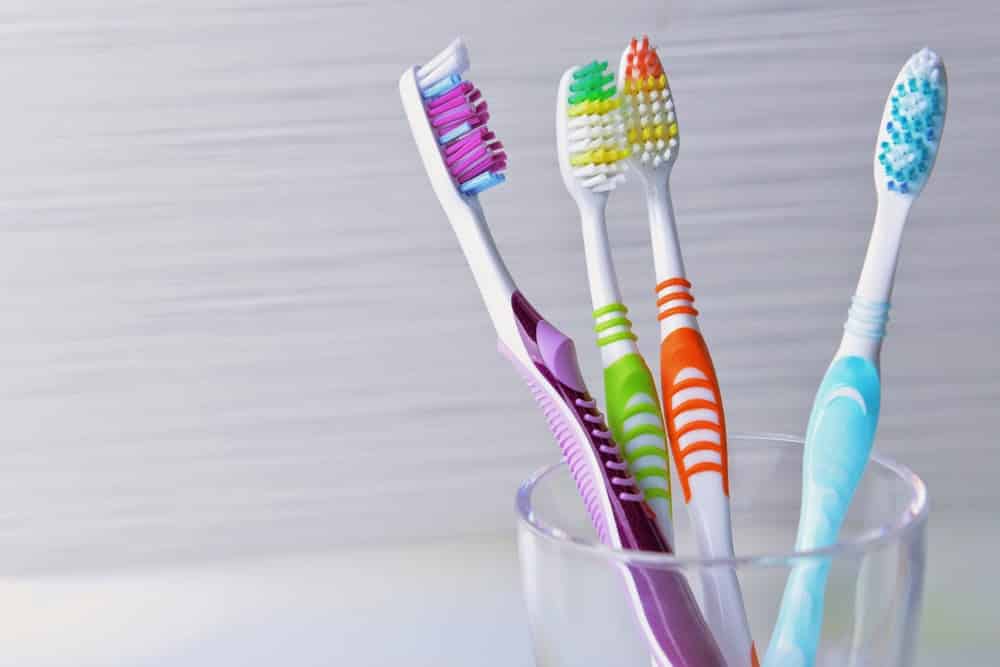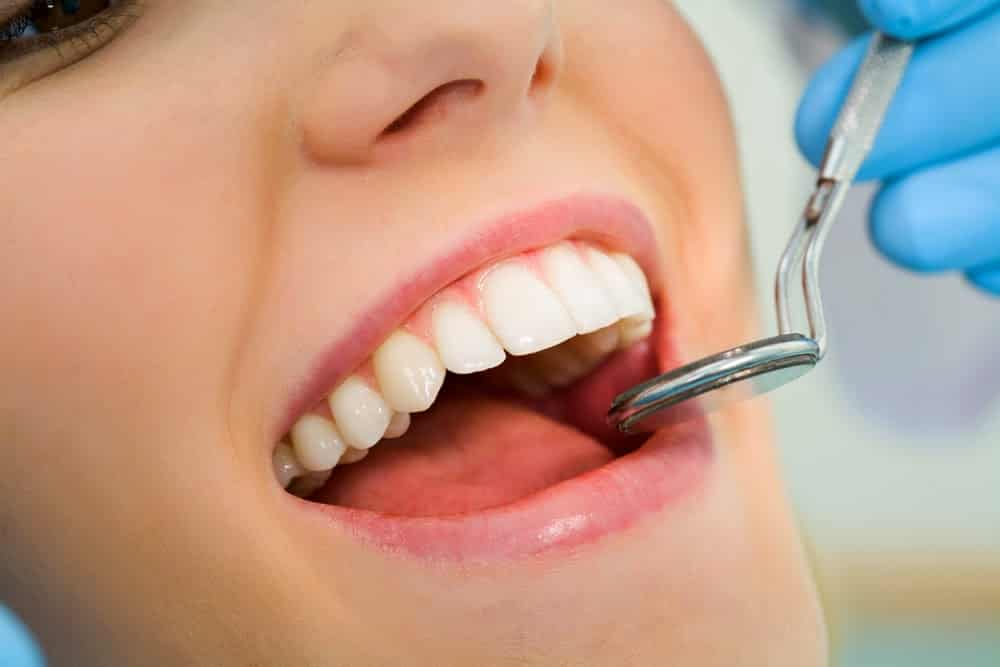For many of us, it’s tough enough dedicating adequate time in our busy days to properly brushing and flossing our teeth. With such limited time, that attention might not always extend to how well you care for your toothbrush when you’re not using it. Unfortunately, improper care can render your toothbrush not only ineffective, but a liability to your dental health, increasing your risk of tooth damage and diseases stemming from poor hygiene.
Most personal bathrooms include a toothbrush holder that keeps the occupants’ toothbrushes off of the counter, usually in an up-right position. Perhaps without realizing it, many people place their toothbrush holders dangerously close to the toilet, where countless colonies of germs congregate. If you prefer, you might store your toothbrush in its own personal holder, complete with a cap to conceal the brush entirely. However, storing a wet toothbrush in a concealed environment can facilitate the growth and accumulation of various bacteria and other microorganisms.
· After brushing your teeth, rinse the bristles thoroughly, passing a clean thumb or finger over them to dislodge food and bacterial particles.
· Shake the brush and bristles, then place it in a holder as far from the toilet and bath tub as possible.
· If you use an enclosed container, try to keep the cap slightly dislodged to allow the brush to air dry.
· Rinse your toothbrush thoroughly before using it, as well, to make sure you don’t transfer unwanted microorganisms to your mouth.
· Once you notice that your bristles are frayed, change your toothbrush for a new one. If three months pass and the bristles still seem strong, change it anyway to be on the safe side.
Dr. Quinn Smith is a well-respected and highly experienced general, restorative, and family dentist in Grand Prairie, TX. He takes a patient-first approach that starts from the moment patients enter our Pecan Tree Dental office, and he offers a three-year guarantee on all dental work that he performs. Whether you and your family are new or returning patients, you can schedule a consultation or your next appointment with Dr. Smith by contacting us at (972) 262-5111.
Is There a Better Way to Floss?
It should be ingrained into your dental hygiene routine so well that flossing is as natural as brushing your teeth. Unfortunately, for many people, it’s not, and for others, a cursory pass between a few teeth once in a while is all of the flossing they’ll commit to. However, if you’re among those who take their dental health seriously and you’re diligent about flossing, then you should know if there’s a better way to floss thoroughly without damaging your sensitive gums. To find out, compare your flossing techniques to our professional recommendations.
Tips for Effective Flossing Techniques
- When it comes to flossing, length matters. Use at least 18” of floss to ensure that you have a fresh section each time you move between your teeth. Wrap the floss around each middle finger, and use your thumbs and index fingers to manipulate the strand.
- Floss carefully between each tooth, bending the floss to the contours of each tooth’s side and carefully moving the floss up and down. Bend the floss to match the opposite tooth’s side and repeat, then carefully extract the floss, expose a clean section of it, and repeat for every crevice.
- Don’t rush. Choose a time of day to floss when you know you’ll have the extra few minutes to devote to your hygiene. Taking your time will help ensure that you remove all of the food debris from between your teeth so they can’t feed the bacteria that live in your mouth.
- Floss before brushing your teeth. The particles that you pick out from your teeth’s hiding spots can remain on your teeth and gums, defeating the purpose of flossing in the first place. Brushing afterwards will help remove the extracted food debris from the surfaces of your teeth.
ABOUT YOUR GRAND PRAIRIE DENTIST:
Dr. Quinn Smith is a well-respected and highly experienced general, restorative, and family dentist in Grand Prairie, TX. He takes a patient-first approach that starts from the moment patients enter our Pecan Tree Dental office, and he offers a three-year guarantee on all dental work that he performs. Whether you and your family are new or returning patients, you can schedule a consultation or your next appointment with Dr. Smith by contacting us at (972) 262-5111.
A Teeth-Whitening Test of Wits
Whether one or two of your teeth are stained, or all of your teeth have just sort of lost their shiny hue, teeth-whitening might be heavy on your mind if you’re unhappy because of tooth discoloration. Despite the ease and convenience of the procedure, however, there are several things you should know about teeth-whitening before deciding if it’s the right option.
Questions About Teeth-whitening
1.) Will teeth-whitening treatment make my teeth sensitive?
a.) Never
b.) Always
c.) Sometimes, but only slightly
2.) What makes professional whitening better than over-the-counter whitening?
a.) Convenience
b.) Strength
c.) Both
3.) Is professional teeth-whitening guaranteed to work?
a.) Yes, because it’s stronger
b.) No, but it usually does
c.) It depends on the nature of your teeth stains
Answers
1.) Sometimes, but only slightly—tooth sensitivity is commonimmediately following a teeth-whitening treatment; however, it can be reduced with sensitivity toothpaste, and will usually dissipate quickly. Many patients experience no sensitivity at all.
2.) Both—professional teeth-whitening can be applied in two ways; either during a single, one-hour visit to our office, or for about half an hour every day (for two weeks) from the comfort of your home. Also, since results are significantly more satisfying, you won’t have to deal with the frustration of a failed OTC application.
3.) It depends—teeth-whitening is designed to erase external stains and brighten the outer layers of your teeth. If one or more teeth are discolored from within (intrinsic staining), then you may need a more involved improvement, like porcelain veneers. After a thorough examination, we’ll help you determine the cause of your teeth stains and the most effective method for treating them.
ABOUT YOUR GRAND PRAIRIE COSMETIC DENTIST:
Dr. Quinn Smith is a well-respected and highly experienced general, restorative, and family dentist in Grand Prairie, TX. He takes a patient-first approach that starts from the moment patients enter our Pecan Tree Dental office, and he offers a three-year guarantee on all dental work that he performs. Whether you and your family are new or returning patients, you can schedule a consultation or your next appointment with Dr. Smith by contacting us at (972) 262-5111.
Important Questions About Gum Disease
It affects over 75% of adults in the United States, and if not treated, it can lead to the permanent loss of one or more of your teeth. It’s also highly-preventable, and most people who experience it could have avoided it, so why is gum disease still one of the most destructive dental health issues around? Typically, gum disease is allowed to progress because of a lack of knowledge about gum health and disease. If you don’t recognize the signs, you might not know to seek treatment in time. For a better understanding about gum disease and how to protect your smile against it, we answer a few important questions about the notorious condition.
Gum Health and Disease
1.) Can gum disease affect anyone?
Some people may be genetically predisposed for a higher risk of gum disease, but under the right circumstances, it can affect anyone. The condition develops when oral bacteria and dental plaque, which are inherent in everyone’s mouth, are allowed to grow and multiply on your teeth and along your gum line.
2.) Is gum disease preventable?
Like most issues that develop from poor hygiene, including cavities and chronic bad breath, gum disease can be prevented by controlling the bacteria and plaque that cause it. Be sure to brush and floss your teeth at least twice every day, and stick to a schedule of routine checkups and cleanings as often as recommended.
3.) How will I know if I have gum disease?
One of the most prominent signs of early gum disease is bleeding gum tissue, usually when you brush and floss your teeth. However, we can detect earlier signs and symptoms, such as minor gum inflammation and recession, with advanced diagnostic equipment during your regular dental checkup.
ABOUT YOUR GRAND PRAIRIE DENTIST:
Dr. Quinn Smith is a well-respected and highly experienced general, restorative, and family dentist in Grand Prairie, TX. He takes a patient-first approach that starts from the moment patients enter our Pecan Tree Dental office, and he offers a three-year guarantee on all dental work that he performs. Whether you and your family are new or returning patients, you can schedule a consultation or your next appointment with Dr. Smith by contacting us at (972) 262-5111.
Understanding Fluoride and Dental Fluorosis
Fluoride is a negatively charged ion of the element fluorine. It’s naturally found in water, food, and soil, and is also artificially synthesized in laboratories for various uses, including water fluoridation. For decades, people have debated the wisdom of treating public water supplies with small amounts of fluoride. On one side of the debate, research has proven that fluoride in small measures promotes healthy mouths by fighting cavity formation. On the other, people believe that fluoridating water supplies is useless and unsafe. Rather than reignite the flames of debate, your Grand Prairie dentist, Dr. Quinn Smith, explains how fluoride helps your teeth and why some people consider it dangerous.
Fluoride’s Benefits to Your Teeth
Tooth decay begins when acids attack tooth enamel, which is a highly mineralized substance that protects the outer surfaces of your teeth. Everything you eat or drink contains elements that oral bacteria also process. When these bacteria synthesize sugars and carbs, the result is lactic acid, which is excreted onto your teeth. Other foods and beverages contain a natural acidity that changes the pH (acid alkali balance) of your mouth to facilitate acid production and damage. The acid dissolves your tooth enamel and siphons minerals from your teeth (demineralization). To strengthen your teeth and reduce the risk of cavity formation, fluoride protects enamel from the demineralization process. If enamel is already damaged by acid erosion, fluoride can accumulate in the demineralized areas and strengthen the outer layer of your teeth through remineralization.
The Risks of Fluorosis
Fluoride’s benefits to dental hygiene were discovered in the early 1900’s, when a dentist in Colorado Springs noted that the townspeople had brown-stained teeth, but very little tooth decay. The resulting research discovered that the discolored but healthy teeth were due to fluoride levels in the water supply. The brown teeth foretold the main drawback of fluoride. If a child is exposed to too much of the mineral during the years when permanent teeth are forming under the gumline, dental fluorosis can affect the tooth enamel’s appearance. These changes can range from barely-noticeable stains to deep discoloration, pits, and grooves. Because fluorosis occurs during permanent tooth formation, it cannot occur once the tooth has already fully developed and erupted.
ABOUT YOUR GRAND PRAIRIE DENTIST:
Dr. Quinn Smith is a well-respected and highly experienced general, restorative, and family dentist in Grand Prairie, TX. He takes a patient-first approach that starts from the moment patients enter our Pecan Tree Dental office, and he offers a three-year guarantee on all dental work that he performs. Whether you and your family are new or returning patients, you can schedule a consultation or your next appointment with Dr. Smith by contacting us at (972) 262-5111.
Children’s Dentistry, Hygiene, and Care
As placeholders for the permanent teeth that have yet to come in, young children’s teeth need as much care as yours; in some cases, more. That care begins with what you teach your children about good hygiene and dental care, from brushing and flossing their teeth to visiting the dentist on a regular basis. Because they’ll carry what they learn into their teens and adulthood, the children’s dentistry services we offer include helping you teach your children the basics of properly caring for teeth.
What to Teach Your Children About Hygiene
You should teach your children to brush and floss their teeth as soon as they’re able to learn (though you can keep their mouths clean until then by doing it for them). However, simply showing them the routine might not generate their interest. You can make the learning process more fun by describing the purpose of brushing their teeth in a story, where they’re the heroes, their toothbrushes are the weapons, and the plaque on their teeth is the villain. Eliminating the bad guy from every surface of their teeth is the only way to defeat it.
How Does Your Child Feel About the Dentist?
Its importance may seem like common knowledge to adults, but to children, visiting the dentist can generate mixed emotions, like wonder, excitement, apprehension, and fear. Part of their dental care education should include becoming accustomed to visiting the dentist on a regular basis, which they should begin doing by the age of two. With a specifically kid-friendly environment, our office is designed to help children feel more at east about professional dental care.
Children’s Dentistry Services
A box full of prizes and a warm, welcoming demeanor are only compliments to the compassionate care we provide for children of all ages. In addition to the kid-centric amenities we offer, Dr. Smith can also help clean, treat, and protect your child’s smile with a variety of children’s dentistry services. For instance, to protect your children’s still-developing teeth from destructive cavities, Dr. Smith may recommend fluoride treatments and/or dental sealants that shield teeth from oral bacteria.
ABOUT YOUR GRAND PRAIRIE DENTIST:
Dr. Quinn Smith is a well-respected and highly experienced general, restorative, and family dentist in Grand Prairie, TX. He takes a patient-first approach that starts from the moment patients enter our Pecan Tree Dental office, and he offers a three-year guarantee on all dental work that he performs. Whether you and your family are new or returning patients, you can schedule a consultation or your next appointment with Dr. Smith by contacting us at (972) 262-5111.
Why It’s Harder for Athletes to Prevent Cavities
Endurance athletes put their bodies through a lot in order to get in proper shape and condition for marathons, triathlons, and other main sporting events. The training period can often be brutal, and while your body may be at its peak fitness at the end, your teeth may not be so strong and healthy. Studies show that, when working out intensely, athletes are at a significantly higher risk for tooth-decaying cavities. Experts owe the phenomenon to a combination of increased risk factors, such as poor dental nutrition and weaker natural defenses, and warn athletes to pay special attention to their dental health when training.
Athletes, Sports Drinks, Carbs, and Cavities
To keep up with the pace of training, endurance athletes consumecopious amounts of carbohydrates in the form of sports drinks, protein powders, shakes, energy bars, and larger, more frequent meals. Unfortunately, your body isn’t the only thing that consumes carbs; so do the bacteria that live in your mouth and dwell in sticky dental plaque. When some of these germs metabolize carbohydrates, they turn it into acids that erode the protective enamel around teeth. The more you consume, the more acids bacteria produce, and the weaker your tooth enamel becomes. Before long, increased enamel erosion will leave teeth vulnerable to infectious oral bacteria, and cavities (holes) will form as the bacteria erode the tooth’s main structure.
Tips to Keep Teeth Physically Fit
· Water is an essential component when working out, but it’s often substituted for more flavorful sports and energy drinks. To reduce your risk of cavities, drink more water more often; it naturally rinses away bacteria and neutralizes the acids they produce. Water will also help prevent dry mouth, or decreased saliva flow, which can create a hospitable environment for harmful bacteria to grow.
· Since you have to eat more, try to brush and floss your teeth more often. About 30 minutes after each meal would be ideal, allowing acids to dissipate and your teeth’s enamel to regain a portion of its strength before you subject it to the rigors of brushing.
· Make routine visits to your dentist an important routine. Because of the additional risk to your dental health, you may have to attend dental checkups and cleanings more than the regularly-recommended twice a year. To strengthen teeth, Dr. Smith can recommend topical fluoride treatments, which fortifies enamel by thickening its weaker layers.
ABOUT YOUR GRAND PRAIRIE DENTIST:
Dr. Quinn Smith is a well-respected and highly experienced general, restorative, and family dentist in Grand Prairie, TX. He takes a patient-first approach that starts from the moment patients enter our Pecan Tree Dental office, and he offers a three-year guarantee on all dental work that he performs. Whether you and your family are new or returning patients, you can schedule a consultation or your next appointment with Dr. Smith by contacting us at (972) 262-5111.
Can a Cavity Strike the Same Tooth Twice?
If a tooth can’t regrow the structure that it loses to a cavity, does that mean that cavities can’t affect the same tooth twice? Unfortunately, they can. Cavities are a result of tooth decay, a bacterial infection; even if the tooth is treated, it’s still susceptible to infection that could destroy what remains of the tooth’s healthy structure. Fortunately, keeping the treated tooth healthy is as simple as keeping the rest of your teeth healthy. Practice good hygiene by brushing and flossing at least twice a day, and attend your regular dental checkup and cleaning as often as recommended.
How to Treat a Cavity
To prevent a cavity from striking twice, it helps to treat the initial cavity with a durable restoration. In most cases, that describes a white tooth filling that can be bonded to your tooth’s structure to effectively seal the cavity from further infection. In extreme cases, the tooth’s inner chamber and root canals may have to be cleaned of infected tissues and sealed before the filling is placed (also called a root canal procedure). If necessary, additional protection can be provided by capping the tooth with a custom-made dental crown.
How to Prevent Cavities
The bacteria that lead to cavity development are found abundantly in dental plaque, and good dental hygiene revolves around controlling plaque before these germs can cause damage. Brushing and flossing your teeth temporarily eliminates the bacterial biofilm, but it forms constantly, and if it remains long enough, it will calcify into tartar. Unlike plaque, tartar can only be removed with professional equipment at the dentist’s office, and if it forms, the bacteria it protects can grow stronger until your next visit to the dentist. Maintaining a schedule of routine dental cleanings will allow Dr. Smith to routinely remove tartar and reduce your risks of cavity development.
ABOUT YOUR GRAND PRAIRIE DENTIST:
Dr. Quinn Smith is a well-respected and highly experienced general, restorative, and family dentist in Grand Prairie, TX. He takes a patient-first approach that starts from the moment patients enter our Pecan Tree Dental office, and he offers a three-year guarantee on all dental work that he performs. Whether you and your family are new or returning patients, you can schedule a consultation or your next appointment with Dr. Smith by contacting us at (972) 262-5111.
Answers to Questions About TMJ Disorder
TMJ disorder (a dysfunction with your jaw’s joints) is one of the most evasive dental issues, despite the sometimes-debilitating nature of the pain it causes. Actually, the wide range of possible TMJ warning signs is one of the main reasons why diagnosing the condition can be difficult. Besides jaw pain, symptoms can also include headaches, earaches, dizziness, and other symptoms that might not even seem to relate to your dental health. To help you determine if you should be concerned about your jaw health, we answer a few common questions about TMJ disorder, and why it causes such widespread discomfort.
What exactly is TMJ disorder?
TMJ stands for temporomandibular joint, two of which connect your lower jaw, or mandible, to your skull, at the temporal bone. TMJ disorder can describe a number of different issues that involve damage, misalignment, inflammation, degradation, or trauma to the joints and the muscles that move them.
What causes the jaw pain?
Your TMJs can be afflicted in a number of ways. For example, an imbalanced bite can force your jaw to work harder, or excessive stress can cause you to consistently clench your jaw and grind your teeth together. In any case, once the joints and muscles are afflicted, they can disturb your jaw’s nerves, which also traverse the majority of your head, neck, and face, spreading the discomfort to numerous other areas.
Can I cure this at home?
In minor cases, the symptoms of TMJ disorder can be relieved with home remedies, such as over-the-counter pain relievers, gently massaging your temples, and placing an ice pack or heating pad over the joints. In other cases, however, you may need professional treatment to alleviate whatever is causing damage to your jaw joints.
ABOUT YOUR GRAND PRAIRIE DENTIST:
Dr. Quinn Smith is a well-respected and highly experienced general, restorative, and family dentist in Grand Prairie, TX. He takes a patient-first approach that starts from the moment patients enter our Pecan Tree Dental office, and he offers a three-year guarantee on all dental work that he performs. Whether you and your family are new or returning patients, you can schedule a consultation or your next appointment with Dr. Smith by contacting us at (972) 262-5111.
What if You Don’t Want a Metal Filling?
Dental fillings, a treatment that restores teeth infected by cavities, are most-often made from a mixture of silver, tin, copper, mercury, and other metals; also known as amalgam. While metal fillings are highly-durable, their popularity is due more to the fact that they’ve endured as effective restorations for over a century and a half. In more modern times, Dr. Smith offers patients a more advanced, and better looking, alternative to metal fillings in the form of white composite resin; commonly referred to as white tooth fillings.
Why a Cavity Needs a Dental Filling
A dental filling involves placing a manmade material, such as metal amalgam or composite resin, into a cleaned and disinfected tooth cavity,or hole in your tooth. Tooth decay, the force behind cavity formation, is caused by infectious oral bacteria, the main components of dental plaque. Once the bacteria are cleared away, a filling can be placed inside of the cavity to restore the tooth’s strength and protect it from infection in the future.
White Tooth Fillings: The Better-Looking Alternative
Since your tooth can’t repair itself, a cavity can leave it structurally weak, and one of a tooth filling’s main responsibilities is restoring its strength. To do so, it must be strong enough to withstand your bite’s pressure. Composite resin is a tooth-colored mixture of acrylic particles that’s applied in a liquid form, allowing it to conform to the shape of your cavity more thoroughly than amalgam. Besides blending in with your smile, white tooth fillings can also be bonded to the surface of your tooth, increasing the structural stability of your restoration.
ABOUT YOUR GRAND PRAIRIE DENTIST:
Dr. Quinn Smith is a well-respected and highly experienced general, restorative, and family dentist in Grand Prairie, TX. He takes a patient-first approach that starts from the moment patients enter our Pecan Tree Dental office, and he offers a three-year guarantee on all dental work that he performs. Whether you and your family are new or returning patients, you can schedule a consultation or your next appointment with Dr. Smith by contacting us at (972) 262-5111.

















